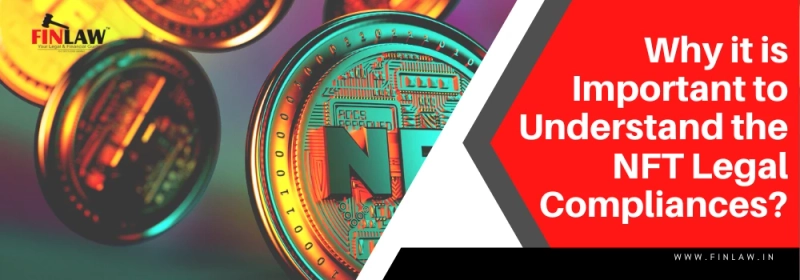Digital assets called Non-Fungible Tokens (NFTs) can be used to prove who owns and how much something is worth about another digital asset, like an original picture, movie, or piece of music. Using blockchain technology and smart contracts, which produce distinctive digital signatures and establish their security, they are issued on these assets. They are currently a very risky market to invest in, subject to sharp drops or rises, and cyber security risks, making them extremely unstable assets to purchase and retain. NFT legal compliances can make the whole things easier.
NFTs are making an effort to address a problem with the requirement to confirm ownership. Since digital content currently oversaturates the internet and it can be difficult to track down and identify the original creator of work posted on online platforms, the value of the original work has decreased as a result of the simplicity with which it can be copied and spread. To enforce decentralization, ownership tracking, and value storage while simultaneously ensuring that the rightful owners claim to the original work is obvious in the event of duplication, NFTs were developed. Through traceable proof of ownership, it promises to serve as a reliable proof of ownership and give the inventor "digital bragging rights."
NFT Legal Compliances-
Blockchain technology is used by both cryptocurrencies and NFTs, and NFTs are typically purchased with cryptocurrencies. In light of this, it is crucial to analyze the legality of cryptocurrencies to comprehend the NFT Legal Compliances.
General Law
India has had cryptocurrency for the last 10 years, but the main discussion surrounding its legality didn't start until the Reserve Bank of India (RBI) published a circular in June 2018 telling banks not to deal in cryptocurrencies.
In Internet and Mobile Association of India v. Reserve Bank of India, the Supreme Court overturned the RBI's decision, ruling that because the ability to trade is a fundamental right protected by Article 19(1)(f) of the Constitution, cryptocurrencies may be exchanged legally.
Securities regulation
Since there is no official legal framework for NFTs and no classification of NFTs under the SCRA, it is unclear if dealing in NFTs is forbidden under the Securities Contract Regulation Act, 1956 ("SCRA"). If NFTs are deemed to constitute derivatives, trading in them would be prohibited in India. The term "derivative" is defined as "a contract whose value is derived from the values of the underlying securities" in Section 2(ac) of the SCRA. According to Section 18a of the SCRA, if NFTs are classified as derivatives, they cannot be traded on virtual platforms; however, identifying an NFT as a derivative would be wrong if it is merely a reference to an actual asset and is used to verify its authenticity.
Act on Copyrights
Although NFTs are an attempt to demonstrate "ownership" of a virtual object, as was already mentioned, possession of an NFT does not necessarily imply possession of the work of art it represents. The copyright of the underlying work of art is not transferred to the owner upon purchase of the NFT. A signed sale contract stating an explicit assignment of copyright is required, by Section 19 of the Copyright Act of 1957, to transfer copyright and be recognized as an owner.
Only the owner of a work has the authority "to reproduce and distribute copies of it," according to Section 14 of the Copyright Act. As a result, it is unlawful to resell or copy the NFT unless the buyer and seller specifically prohibit such behavior. The copyright frequently remains with the person who created the work unless the parties agree otherwise.
Guidelines for Income Taxes
The majority of the time, the tax treatment of NFTs should be determined by the nature of the underlying asset. A digital art NFT can be regarded as an intangible asset or good for income tax and the Goods and Services Tax (GST), in which case taxes must be disclosed and paid on the item. In light of this, the government recently announced a flat 30% tax on all virtual digital asset revenue, including NFT income. The prospect of paying such high taxes is undoubtedly deterring newcomers and day traders who conduct numerous transactions each day. The value of such cryptocurrencies and related digital assets could fall drastically if this drives current and potential investors out of the market.
FEMA guidelines
FEMA guidelines are coming under NFT Legal Compliances. Whether the underlying asset is physical or digital, the Foreign Exchange Management Act and rules, which govern cross-border transactions, will apply depending on its classification. Despite the lack of clarity, NFTs might be categorized as "intangible assets" and covered by the FEMA regulations on software and intellectual property. Since they are enabled by "global ledgers," which means that the information is logged, exchanged, and synchronized across data stores, knowing their location becomes crucial.
Cooperative Investment Programs-
Mutual funds or investment funds are two different types of collective investment schemes (CIS). The characteristics of an NFT and the rights offered to token buyers will decide whether or not it qualifies as a financial instrument, and the token's non-fungibility does not influence the NFT's regulatory status. It is likely to be categorized as a utility or exchange token if the primary goal of the NFT is to grant the capacity to keep, buy, and sell the asset. Registration and the purchase of a collective investment undertaking license may be necessary to issue NFTs that are eligible to be used as CIS units.


